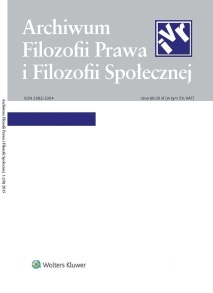Uzasadnienie zdania odrębnego jako wypowiedź dialogiczna na przykładzie wybranych orzeczeń Trybunału Konstytucyjnego
Statement of reasons for a dissenting opinion as a dialogical utterance on the example of selected rulings of the Polish Constitutional Tribunal
Author(s): Maciej WojciechowskiSubject(s): Law, Constitution, Jurisprudence, Constitutional Law, Ethics / Practical Philosophy, Philosophy of Law, Philosophy of Law
Published by: Stowarzyszenie Filozofii Prawa i Filozofii Społecznej – Sekcja Polska IVR
Keywords: dissenting opinion; dialogical utterance; dialogue; judicial deliberations; statement of reasons for a court judgment; Constitutional Tribunal; legal disagreement
Summary/Abstract: This paper claims that the statement of reasons for a dissenting opinion is a dialogical utterance. Due to the limitations imposed by the secrecy of judicial deliberations it is impossible to describe the direct exchange of arguments between the members of a judicial panel. To some extent, however, we can assume that the presented opinion of the court and a dissenting opinion represent the end result of such deliberations. It is not the same, however, to call both of them examples of dialogue. Real-time dialogue consists of a multitude of utterances of people taking part in a discussion. In the case of the final statement of reasons of the judgment and of the dissenting opinion, the number of utterances is in general limited to two separate large blocks of sentences, each block being one utterance. For this reason we can distinguish between the notion of ‘dialogue’ and that of ‘dialogical utterance’. Such a distinction was proposed in Polish theory of literature in the 1970s by J. Lalewicz. According to Lalewicz, a dialogical utterance depends on the preceding opinion, and its main feature is the ability to become a reference to that opinion. Apart from presenting forms of dialogicality, the article aims to explain these forms by presenting features other than the personal style of legal writing of a given judge. Three factors that might explain the higher or lower level of dialogicality in dissenting opinions are presented. The first factor is of an institutional nature, that is, the way work in the court is organised. The second factor is what I call a potential for an argument. Finally, the third one is the axiological importance of a given case.
Journal: Archiwum Filozofii Prawa i Filozofii Społecznej
- Issue Year: 16/2018
- Issue No: 1
- Page Range: 69-82
- Page Count: 14
- Language: Polish

